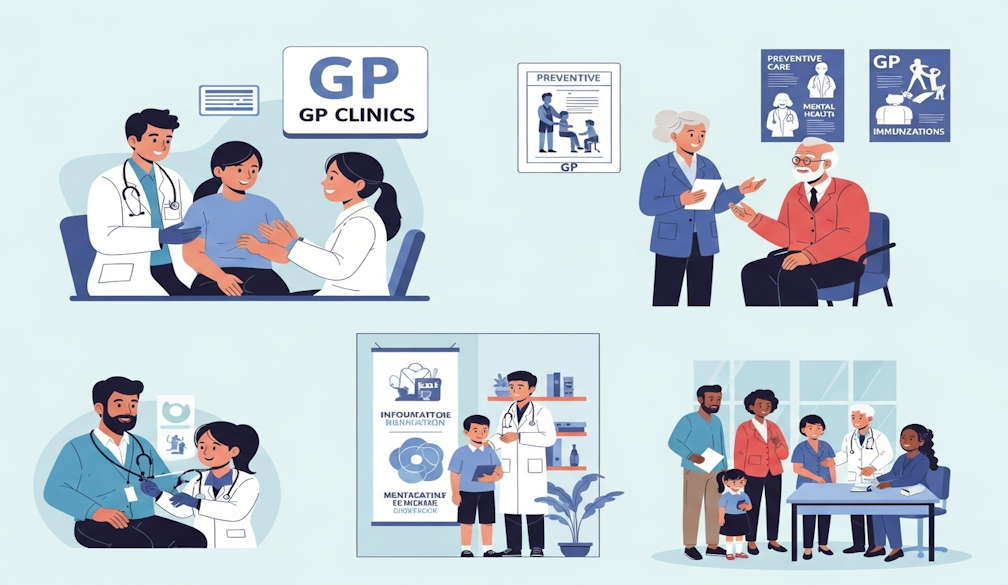Why Choosing the Right GP Clinic Matters for Your Health

Healthcare is one of the most important aspects of life, and having access to a reliable GP clinic makes a significant difference in managing both everyday and long-term health needs. A general practitioner is often the first point of contact when patients experience health concerns, providing diagnosis, treatment, and referrals when required. A trusted GP clinic not only offers medical expertise but also builds lasting relationships with patients, ensuring continuity of care across all stages of life.
The Role of a GP Clinic in Primary Care
A GP clinic plays a central role in primary healthcare. General practitioners provide comprehensive services ranging from preventive care and check-ups to managing chronic illnesses and minor injuries. They are trained to diagnose a wide range of conditions and to decide whether specialist care is necessary. This makes the GP clinic a vital hub in the healthcare system, ensuring that patients receive the right treatment at the right time.
Why Regular Visits to a GP Clinic Are Important
Many people only visit a GP clinic when they are unwell, but regular check-ups are equally important. Routine health assessments help identify issues early, such as high blood pressure, diabetes, or cholesterol problems, before they become serious. A GP also provides vaccinations, health screenings, and advice on lifestyle habits that support long-term wellness. By building a relationship with a GP clinic, patients gain access to personalised care that prioritises prevention as much as treatment.
Comprehensive Services at a GP Clinic
A well-established GP clinic offers more than just consultations. Services often include women’s and men’s health, children’s health, immunisations, travel medicine, skin checks, and mental health support. Chronic disease management is also a major focus, helping patients with conditions such as asthma, diabetes, and arthritis manage their symptoms effectively. Having these services available in one place makes a GP clinic a convenient choice for individuals and families alike.
The Value of Continuity of Care from a GP Clinic
Continuity of care is one of the biggest advantages of choosing a regular GP clinic. When patients see the same doctors consistently, the clinic develops an understanding of their health history, lifestyle, and specific needs. This allows GPs to provide more accurate diagnoses and tailored treatment plans. Continuity also builds trust, making patients feel more comfortable discussing sensitive health issues and following medical advice.
How a GP Clinic Supports Families
A family-focused GP clinic provides care for patients of all ages, from newborns to seniors. For parents, having a reliable GP means easy access to children’s check-ups, vaccinations, and advice on growth and development. Adults benefit from preventive care, reproductive health services, and chronic condition management, while older patients receive ongoing support for age-related concerns. By offering services across the life cycle, a GP clinic becomes a long-term partner in family health.
Emergency and Urgent Care at a GP Clinic
While hospitals handle major emergencies, many urgent but less severe health issues are best managed at a GP clinic. Conditions such as infections, minor injuries, or sudden illnesses can often be treated quickly by general practitioners. This saves time and avoids unnecessary visits to emergency departments. Many clinics also offer same-day appointments, ensuring patients get the care they need without delay.
Mental Health Support at a GP Clinic
Mental health is just as important as physical health, and a GP clinic plays a critical role in this area. GPs are often the first professionals patients turn to when experiencing stress, anxiety, or depression. They provide initial support, treatment options, and referrals to psychologists or psychiatrists if needed. Having access to mental health care through a trusted GP clinic helps patients feel supported and ensures they receive timely intervention.
Choosing the Right GP Clinic
When selecting a GP clinic, patients should consider factors such as location, available services, qualifications of the doctors, and the overall approach to care. A good clinic should be welcoming, professional, and focused on patient well-being. Technology also plays a role, with many clinics now offering online bookings, telehealth consultations, and digital health records for convenience. Choosing the right clinic ensures patients receive care that is both accessible and comprehensive.
Conclusion: Why a GP Clinic is Essential for Everyday Health
A GP clinic is more than just a place to visit when you are unwell—it is the foundation of primary healthcare. With services that cover preventive care, chronic disease management, mental health, and family health, a GP clinic ensures that patients are supported through every stage of life. By building a long-term relationship with a trusted clinic, individuals and families gain access to consistent, personalised care that safeguards their health and well-being. Choosing the right GP clinic is an investment in a healthier, more confident future.
